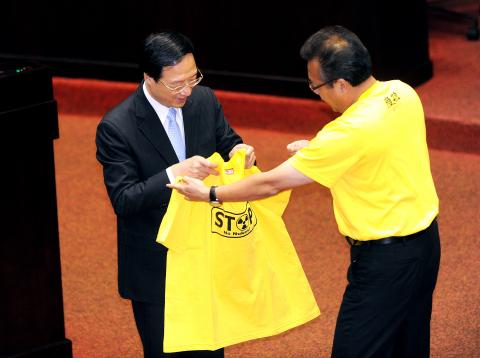A nationwide referendum remains the best available option to determine the fate of the controversial Fourth Nuclear Power Plant in Gongliao (貢寮), New Taipei City (新北市), despite most public opinion polls showing strong opposition to the continued construction of the plant and the use of nuclear energy, Premier Jiang Yi-huah (江宜樺) told the legislature yesterday.
“Public policy should not — and will not, as far as I am concerned — be decided by public opinion polls,” Jiang said in response to a question from Democratic Progressive Party (DPP) Legislator Huang Wei-cher (黃偉哲) in a plenary session.
Jiang on Monday evening met with Taipei Mayor Hau Lung-bin (郝龍斌), New Taipei City Mayor Eric Chu (朱立倫) and Keelung Mayor Chang Tong-rong (張通榮) — whose cities are within the mandatory evacuation radius of the Gongliao plant — to discuss the issue.

Photo: Lo Pei-der, Taipei Times
The three-hour meeting apparently made little progress in ironing out disagreements. Hau said he remained opposed to completing the plant, while Chu reiterated that the government must come up with ultimate solutions for the disposal of nuclear waste and guarantee that the Gongliao plant will be risk-free.
Citing concerns over nuclear safety and construction flaws at the plant, opposition parties and anti-nuclear advocates have called on Jiang to order the suspension of construction at the plant, but Jiang appears determined to resolve the issue through a referendum.
He ridiculed the DPP yesterday for advocating a referendum on the plant for more than a decade, but doing an about-face when he proposed holding one.
Jiang raised eyebrows when he told Huang that Taiwan “has the capability, technology-wise, to handle nuclear waste” and the only problem left was finding a permanent waste storage site amid strong opposition from residents in proposed areas.
However, in response to a question from DPP Legislator Kuan Bi-ling (管碧玲), Jiang refused to pledge to submit a comprehensive plan on nuclear waste management before holding the proposed national referendum. Kuan said the government does not have answers to three aspects of Taiwan’s nuclear future — quality of the construction at the Fourth Nuclear Power Plant, nuclear waste management and contingency evacuation plans.
Kuan said the government’s evacuation plan for nuclear disasters, which sets out a three-tier evacuation zone within a radius of 3km, 8km and 16km of a nuclear power plant, was “ridiculous” because most of the designated shelters were too small to accommodate the number of people in the zones.
Jiang said the government would not ignore safety concerns about the Fourth Nuclear Power Plant, saying that the names of a panel of experts to conduct a thorough inspection of the plant would be announced on April 2 and the Atomic Energy Council would be the final “gatekeeper,” since the plant cannot become operational without the council’s approval.
Jiang and Minister of Economic Affairs Chang Chia-juch (張家祝) both refuted a recent article by US-based electrical power expert Chen Mo-shing (陳謨星), who said the price of nuclear power in Taiwan has been greatly underestimated and the government’s claim that electricity prices would rise if the Gongliao plant did not go into operation was “a lie.”
Chen’s calculations “were far from the truth and reality,” Chang said, because the cost of electricity production per megawatt hour at the first, second and third nuclear power plants was under NT$1 and would be less than NT$2 at the fourth plant.
Additional reporting by Shih Hsiu-chuan

Alain Robert, known as the "French Spider-Man," praised Alex Honnold as exceptionally well-prepared after the US climber completed a free solo ascent of Taipei 101 yesterday. Robert said Honnold's ascent of the 508m-tall skyscraper in just more than one-and-a-half hours without using safety ropes or equipment was a remarkable achievement. "This is my life," he said in an interview conducted in French, adding that he liked the feeling of being "on the edge of danger." The 63-year-old Frenchman climbed Taipei 101 using ropes in December 2004, taking about four hours to reach the top. On a one-to-10 scale of difficulty, Robert said Taipei 101

Nipah virus infection is to be officially listed as a category 5 notifiable infectious disease in Taiwan in March, while clinical treatment guidelines are being formulated, the Centers for Disease Control (CDC) said yesterday. With Nipah infections being reported in other countries and considering its relatively high fatality rate, the centers on Jan. 16 announced that it would be listed as a notifiable infectious disease to bolster the nation’s systematic early warning system and increase public awareness, the CDC said. Bangladesh reported four fatal cases last year in separate districts, with three linked to raw date palm sap consumption, CDC Epidemic Intelligence

US climber Alex Honnold left Taiwan this morning a day after completing a free-solo ascent of Taipei 101, a feat that drew cheers from onlookers and gained widespread international attention. Honnold yesterday scaled the 101-story skyscraper without a rope or safety harness. The climb — the highest urban free-solo ascent ever attempted — took just more than 90 minutes and was streamed live on Netflix. It was covered by major international news outlets including CNN, the New York Times, the Guardian and the Wall Street Journal. As Honnold prepared to leave Taiwan today, he attracted a crowd when he and his wife, Sanni,

Taiwanese and US defense groups are collaborating to introduce deployable, semi-autonomous manufacturing systems for drones and components in a boost to the nation’s supply chain resilience. Taiwan’s G-Tech Optroelectronics Corp subsidiary GTOC and the US’ Aerkomm Inc on Friday announced an agreement with fellow US-based Firestorm Lab to adopt the latter’s xCell, a technology featuring 3D printers fitted in 6.1m container units. The systems enable aerial platforms and parts to be produced in high volumes from dispersed nodes capable of rapid redeployment, to minimize the risk of enemy strikes and to meet field requirements, they said. Firestorm chief technology officer Ian Muceus said